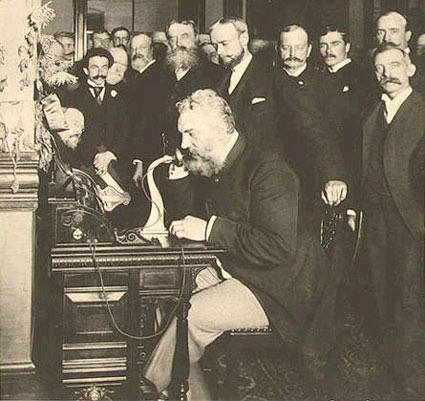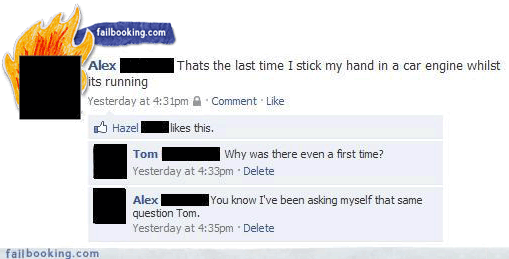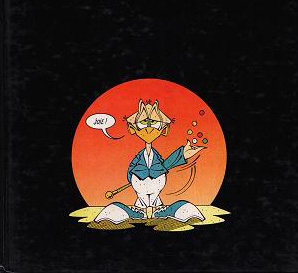Something important: The Internet, a rant
Written by David Dylan
As an avid Internet user (I don't watch TV. Last time I turned on the TV after a hiatus of about a year, it was still the same old drivel and House reruns, so why bother.) I find myself spending a lot of time on forums of some sort or other. No life? Maybe. I'm not sure I care, actually.

A search for "House" brought this up as first result, what this says about western civilization, I'll leave up to you.
A few observations:
There's this funny thing about the Internet; its development seems to be moving in reverse when compared to other media. When the telephone was invented, I imagine, people had difficulty figuring out how to use it. I'm picturing gents in bowler hats gesturing wildly while saying things like "there! Where I?m pointing!" not realising the person on the other end couldn't see them. Time zones must have caused quite some hilarity, too.
Eventually, though, society as a whole developed a set of unwritten rules for telephone usage. You greet the person calling (unless you are American) and identify yourself. Then you ask if you are calling at a convenient time (again, unless you are American) and you give the callee some time to get to grips with the situation, recall who the caller is and pretend to care.

Gentlemen, may I be the first to communicate this: "First!"
It may come as a surprise to some, but the Internet started out as an incredibly polite place. After a brief period of adjustment, the folks using this newfangled Internet developed an etiquette (net-iquette) for the 'net and enforced it.
People engaged in conversation, shared insights, and ganged up on AOL users.
It was also clear to most that the Internet was for communicating, and essentially public. While it was generally understood that you listened a while before jumping in, you were welcome to the conversations. No one was surprised when a stranger butted in, unless of course, the discourse was held in a private environment, like E-mail. (Still, those 'I read your E-mail' T-shirts were not just a mildly funny joke, security being in its infancy as much as the Internet itself.)
It was a bit like a party; you mingle, you look around, you add to the conversation if you have something to say, and when you've had a bit of fun, you mingle on.

It was one great party.
These days, though...
The party has most definitely derailed. People don't engage in conversations, but rather stand in a corner and shout their opinions without waiting for feedback. Particularly funny or interesting opinions might draw a crowd, and even comments, but essentially people have turned the first truly two-way medium into one-way by sheer obstinacy and outright refusal to adapt their thinking.
If it is true that innovation, change, evolution, is born out of need, then the inverse must be true; that regression, stagnancy and devolution is born out of abundance.
Humans are social animals, but more than ever; now it is becoming clear that we developed thus out of need. When the perceived need drops away, so does the thin layer of civilization around the sociopathic core.
I'm from a small island. One thing islanders know is that they are stuck there, together. The person you flip the bird because he cut you off in traffic today might be the guy interviewing you for a job tomorrow. Islanders are the ultimate example of social behaviour born out of need. They need each other, so they develop rules for social interaction based on the fact that human resources are limited. This goes two ways; Islanders are probably the first to implement a 'don't ask, don't tell' policy. Where I'm from, it is understood that while social structures, rules of social interaction and mores are incredibly strict, they extend no farther than your front door. People respect boundaries, including the one that delineates your property, and what you do there is entirely your own business. On the other hand, in public the rules are rigid. Being 'rude' is a much stronger accusation in such small communities than it is in general western society.
Once upon a time all human societies were such small 'islands'. In Europe this was simply because even if you could afford the luxury of a horse, the next town over was still a day's travel away.

A horse.
It's not just the Internet that has stripped individuals from the security and guidance of the island and thrust us into this whirlpool of anonymity. It is arguably a process that has been going on since the advent of the city in the late medieval period.
I was once on holiday with my, then, girlfriends' parents. We were in rural Italy, near Florance. (An area I can recommend, by the way.) We were going out for dinner, and I wanted to get dressed and shave. My girlfriends' father didn't think there was any need, we were on holiday and these people would "never see us again". I didn't, and don't, see his point. Being moderately, at least, well groomed is a sign of respect to the people you encounter. I don't care about what style you pick, having sported long hair and a yellow Mohawk during certain periods in my life myself, but I do think that the effort counts.
The perception of anonymity in a group makes people lose their civility. (Said father was extremely civil in many other ways, don't get me wrong. If I had to pick me a third father, he'd be first on the list.)
The Internet has opened up the world for many people. People who never look past their own inner-circle, find themselves an extremely small cog in a very big machine and their psyches can't cope.
Cheap computers, readily available broadband and increasingly easier to use interfaces also means the experience has become more and more instant. There is no learning curve, no sense of being 'new' and the humility that brings. Frankly, without wanting to sound hateful, it also means the bar has been lowered beyond a point where people we wouldn't invite to a party can now join in without restriction or buffer to help them, or force them, to spend time to adapt to their new surroundings. Grandmothers who can barely get their head around the fact that people the next table over at the nursing home's rec. room might not want to hear about your bedwetting find themselves on Facebook, not grasping the sheer size of the audience.

Facebook, the true home of Fail.
The lack of boundaries also means that the sort of people whose rules of social interaction weren't our own to begin with can now follow us around regardless of the fact that we would be happy to let them stew in real life. The jocks, the frat boys, the drama-queens, the 'popular girls'... They were a pain when we couldn't avoid them in school/college, and they are a pain now. They didn't then, and don't now realize that we think they are the epitome of 'loser' and do not want to stay in touch, not even to be the audience to their inflated egos.

And their wit... how dull life in college would have been without it.
But don't discount the 'nice' and 'intelligent' people. In a way, we are all the 'losers' to someone else, and we all find ourselves at the same party and to a greater or lesser degree threading on offline boundaries because they have dropped away online.
For example: I recently encountered a rather funny blog post from a woman who analysed and commented on a message she received from a rather blatant and particularly dim guy trying to 'pick her up' to use their parlance. It amused me, but I was busy so I moved on.
I noticed that this woman had repaid the visit, so I went to refresh my memory and found the post again. This time I was actually bored, so I commented, sharing some of my experiences from a male perspective, with this type of person. I also invited the blogger to con.ca, thinking that her writing style would well fit here.
She hasn't responded yet, and very well might never. That's not the crux of this example. It doesn't, also, bother me much. I was bored, I had something to share and I moved on to the next group at the party.
Something else happened there though. At first I was going to dismiss it because this sort of thing is so common in online communication, but as I was writing this article I more and more started to realize that this was the perfect example right there.
Someone else responded. Someone from her 'friends' list.
The response was "Really important, dude." (Liberally translated. In Dutch the choice of wording conveys sarcasm and derision.)
This sort of thing is all too common in online communication. This poster was, as I was, just fly-by posting. He didn?t know me, he wasn?t interested in a conversation or me as a person, and probably rightly so. He was just acting on an impulse, a need to belittle someone else in an effort to feel better about himself. He took a pot shot at someone who presented himself as a target by going outside of the rules of social interaction this person adheres to. From his perspective, his disregard for me is entirely justified. I annoyed him, or I simply acted outside of his norms, and being a human being he felt the natural urge to kick the deviant member of the tribe back in line.
To him, I was the one crossing the boundaries of social interaction. Whether in his mind these boundaries were based on my age, and I invoked his ire by, on some subconscious level in his mind, moving in on his 'hunting grounds' by talking to someone his age and by several decades not my own or I was not 'their sort of people' in some other way, it was obvious I had moved across a line I do not see, and he does. Perhaps it was my response itself, maybe in his circles people don't share such information, or in that way. I will probably never know.
It's like singing in the street: In some cultures people will break out into song when they feel like it, in others people will be embarrassed and even a bit afraid of people spontaneously singing in a public setting. To him, I was the weird kid singing in an inappropriate setting, and he responded with a mixture of embarrassment, fear and rejection, trying to shut me up. As is a perfectly natural response to someone acting outside of cultural mores.
In any case, I mean no disrespect towards him, even though he crossed a line with me. It?s a line he doesn?t see as much as I don't see his. I'm merely theorizing here, and I have never met him in my life, so my theory is based entirely on more or less educated guesswork.
But from my perspective several things happened there. It was, in fact, a very complex set of boundaries that he, in my mind, crossed. I will try to explain.
- He broke into a conversation, which, while not private, had not hitherto included him.
- He embarrassed me, a stranger, in public.
- He publicly elevated his opinion and therefore his person over me, and mine.
- He embarrassed the original poster, whose relationship with me is unknown to him. I could be an employer, a family member or just a stranger.
Now, I do not really fault him. I had a peek at his profile and it is obvious that he?s part of a subset of society where such behaviour is the norm. This is why we have jokes about them and on the whole ignore them until they either grow up or become managers. The equivalent on the American continent would be the 'frat boy'.
In real life, he would be the guy at the party who gets drunk just that little bit too quickly, jumps from conversation to conversation simply to interject irrelevancies, and who tells all who want to, and all who do not want to, hear how cool he is. Annoying, but harmless.
The trouble is, that to some degree, the Internet is turning all of us into this guy. The party has gone from people mingling to people standing on their own, shouting one-liners about whatever springs to mind without filters or context.
All context has faded, often into nothingness. Rules of social interaction fade with it, after all, in a way we are all at our own party and everybody else is on our turf. Lacking clear delineations of social settings, we act on the only rules we are sure of: our own.
So, while I was, to stick wit the party analogy, just adding my own anecdote to the conversation, just 'mingling' with no more intimacy or pretext than that found when people meet at the buffet-table and acting perfectly natural for that setting, in the mind of this person I might have been intruding on a private setting I was not aware of. The blogger herself might interpret my approach as an attempt to engage her in conversation (which, of course, to a degree it was) and may feel this perfectly natural (she posted a public blog, after all) or wholly inappropriate. She might think of me as the creepy guy sending her a drink from the other side of the bar, or a party-guest simply moving past her circle to see if the discourse there is interesting.
What is needed, therefore, is a new set of rules for interaction, online. But wait, didn't we used to have those? Indeed, we did. But here we get back to what I observed earlier in this piece: anonymity of scale strips people of that thin evolutionary developed layer of civilization. We are thrown back to the animal state in which social interaction consists of, at best, establishing hierarchy. What the fellow from my example was doing was establishing hierarchy within the setting. He was a 'friend', I was a 'stranger', and I'd wandered into 'his' cave. Nothing more. In effect, I was nothing to him but a set of behaviours. He didn't feel the need to see me as something more.
Much in the same way that in the animal world, other animals are perceived as very simple sets of behaviour; the 'mother, cares for me' behaviour, the 'stronger ape, dominates me' behaviour, the 'tastes good, is food' behaviour, and so on.
Once upon a time the Internet was an island, and people on it behaved as islanders do. Now, the Internet is a crowd, a big one, and in it we are all an island of one. How we respond to this frightening and overwhelming sensation, alien to our psyches, depends on the strength of our personality. People who aren?t all that pleasant offline will cut loose online and indulge their sociopathic tendencies, others may retain more degrees of civility. All of us, however, to varying degrees succumb to the lure of being the invisible man and sneaking into the girl's dressing room. The one thing that stood between this trend and us was Netiquette, and Netiquette is well and truly dead.
Netiquette said that my actions were perfectly acceptable. I didn't 'spam', I replied when 'invited' to (by the presence of a 'comment form') and I was 'on topic'. The pack-mentality, however, branded me an intruder. A threat.
It would be interesting to see how this situation evolves, but the cynic in me expects that before a new equilibrium and mores can evolve, the whole thing will have collapsed under the weight of spam, flame-wars and people tweeting about their bowel movements.
We live in interesting times, indeed. Meanwhile I'm not going to be deterred. To quote the comic character 'Lunk': "In a world where cowardice, hypocrisy and ignorance are the norm, there is but one course of action... Joining the mess and enjoying yourself. Groovy!"

Groovy.
Metadata:
- ID: 3930
- Type: 2
- Title: Something important: The Internet, a rant
- Subtitle:
- Author: David Dylan
- Author ID: 109
- Date Posted: 2010-02-15T10:00:19